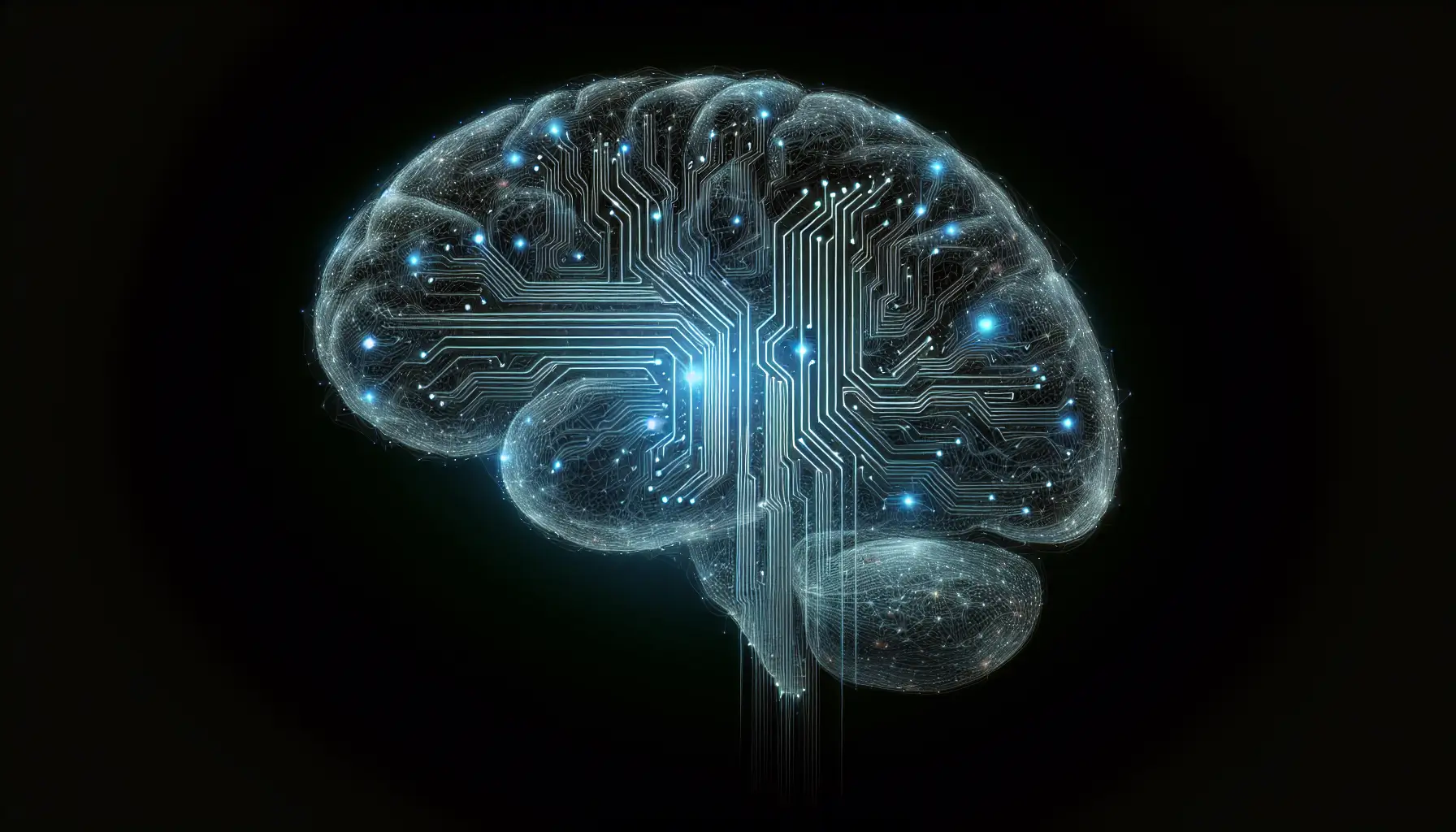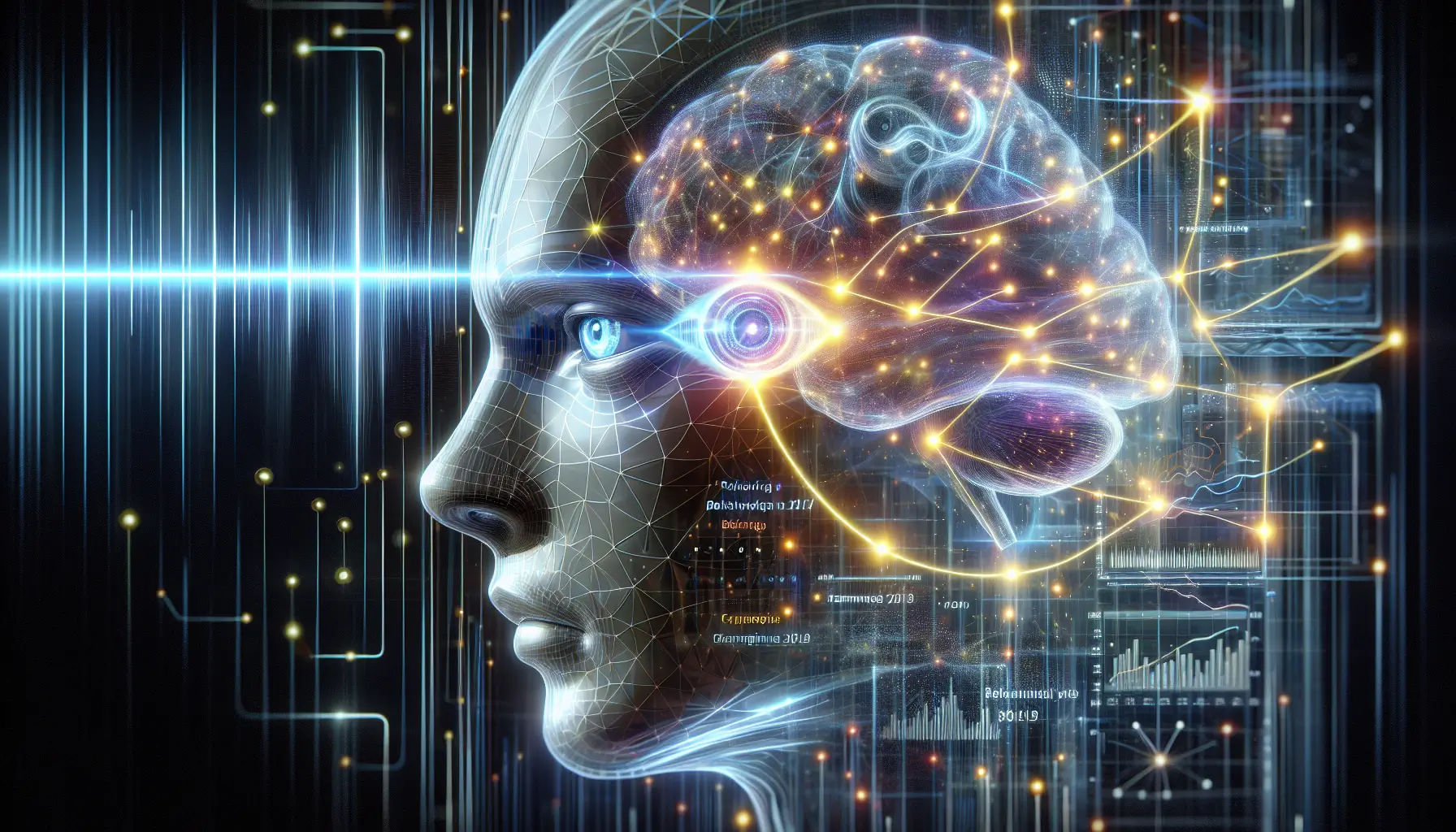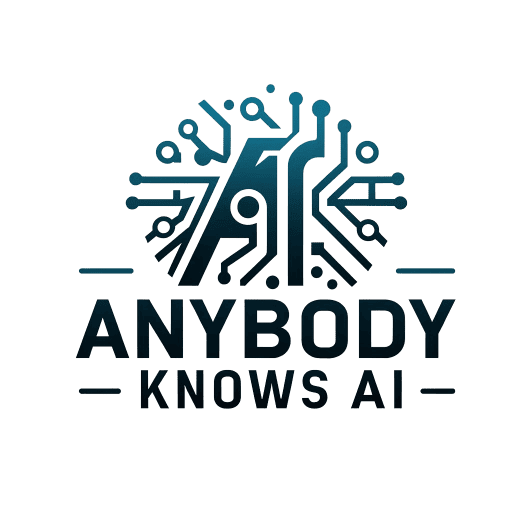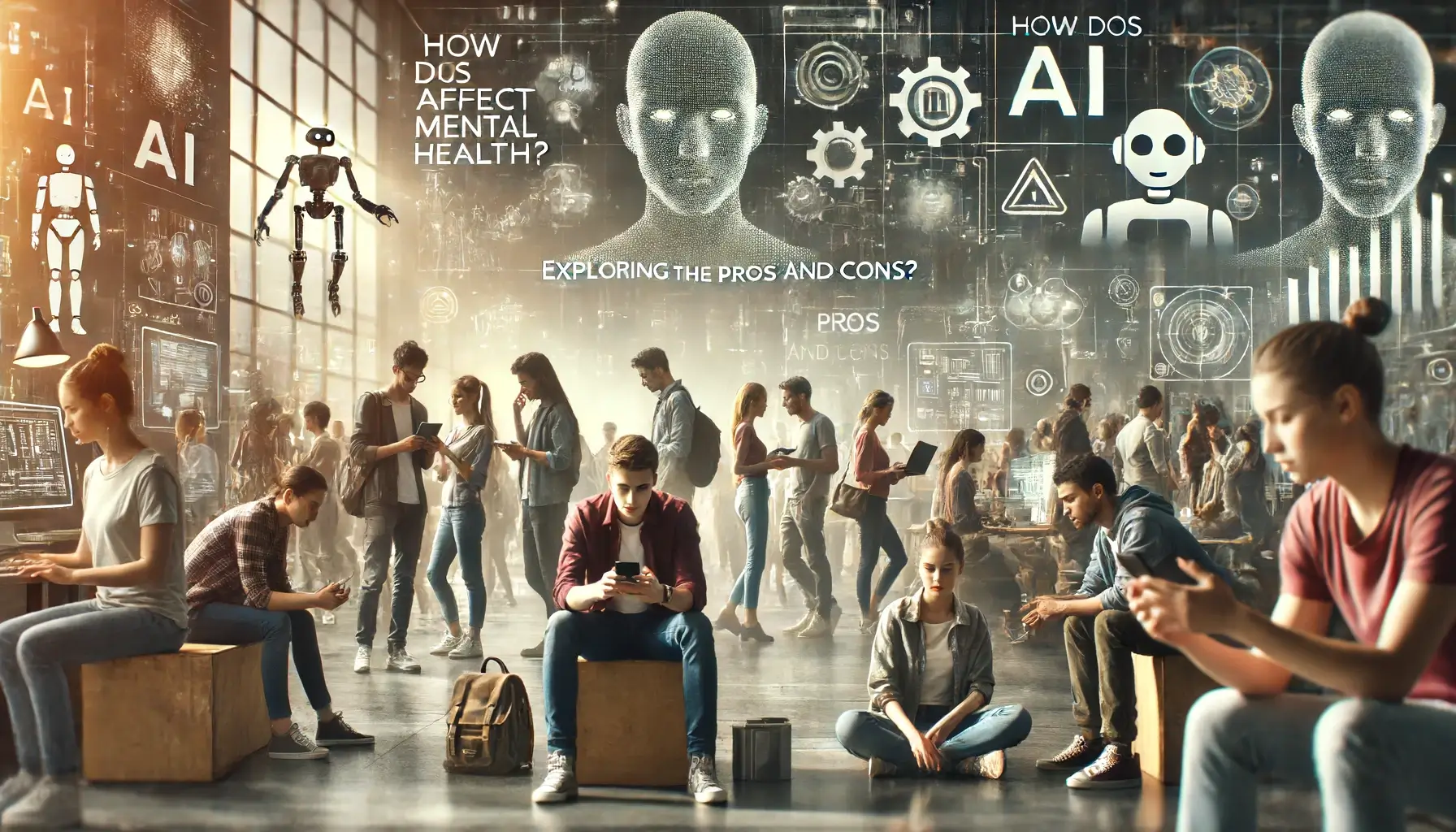AI is increasingly influential in mental health care, revolutionizing diagnostics, treatment, and support. It offers significant benefits, like personalized care and 24/7 support, but poses risks like privacy concerns and biases. This article will explore “How does AI affect mental health,” weighing the pros and cons.
Key Takeaways
- AI revolutionizes mental health care by enhancing diagnostics, enabling personalized treatment plans, and providing round-the-clock support through chatbots and virtual assistants.
- AI technology fosters greater accessibility and equity in mental health services, making support available to those in underserved or rural areas and addressing the pivotal issue of healthcare democratization.
- Despite its benefits, integrating AI in mental health care raises significant ethical concerns, including privacy issues, potential biases in AI systems, and a lack of cultural sensitivity, necessitating responsible and ethical use.
| Aspect | Pros | Cons |
|---|---|---|
| Accessibility | – Increases access to mental health care, especially in remote areas or for those with mobility issues. | – May not be accessible to all due to digital literacy or access to technology. |
| Cost | – Reduces the cost of mental health care through affordable apps and AI-driven therapy. | – Initial setup and development costs for AI tools can be high. |
| Anonymity | – Provides anonymous and private treatment options. | – Anonymity may reduce accountability and the depth of human connection in therapy. |
| 24/7 Availability | – Offers around-the-clock support, making mental health care more flexible. | – Continuous availability might lead to dependency on AI tools. |
| Data Collection | – Facilitates extensive data collection for a better understanding of mental health trends. | – Raises significant privacy and data security concerns. |
| Consistency | – Ensures consistent delivery of therapeutic interventions and monitoring. | – Lack of personalization might fail to address individual nuances in mental health needs. |
| Support for Professionals | – Helps mental health professionals with administrative tasks and enhances their capabilities. | – Potential to replace human jobs, leading to professional displacement concerns. |
| Bias and Fairness | – AI can be designed to be unbiased with proper training and data. | – Risk of AI adopting and amplifying existing biases in mental health treatment. |
| Autonomy | – Empower users to manage their mental health independently with self-help tools. | – Over-reliance on AI could diminish personal autonomy and coping skills. |
| Effectiveness | – Proven effective for certain conditions and as a supplement to traditional therapy. | – Effectiveness varies; not all AI tools are backed by robust scientific evidence. |
| Ethical and Regulatory Issues | – Potential to adhere to ethical guidelines with proper oversight. | – Lacks clear regulation, leading to ethical and legal challenges. |
The term ‘Artificial Intelligence,’ coined by John McCarthy in 1956, heralded the beginning of a journey to replicate human intelligence in machines. Today, AI’s impact on society profoundly influences many aspects of daily life, from communication to our jobs. Yet, amid advancements and the promise of AI, not everyone is fully aware of its potential to transform mental health care.
AI is not only about algorithms and big data; it’s about the potential to support those in need, prevent job loss due to untreated mental health issues, and equip young adults with new skills to cope in an increasingly complex world.
A systematic review of the role of AI in mental health reveals that it offers a beacon of hope for those seeking to enhance their psychological well-being. Yet, the appropriate use of AI in this sensitive domain is subject to a scoping review, as it must navigate the complexities of echo chambers and the nuances of human emotions.
Enhancing Mental Health Diagnostics

Mental health care is on the brink of a transformation, with AI leading the charge in diagnosing mental health disorders, including mental illness, with unprecedented accuracy and efficiency. Gone are the days of one-dimensional assessments; today, AI-driven algorithms delve into electronic health records, offering a multi-faceted view of mental health conditions.
As a result, JMIR mental health research is becoming increasingly important in the field, especially when it comes to addressing mental health problems.
This advancement plays a critical role in mental health research, opening doors to personalized mental health services and therapeutic interventions previously unimagined in clinical settings.
Personalized Treatment Plans
In mental health care, AI is a testament to the power of personalized therapeutic interventions. Traditional methods, while effective, often operate on generalizations that may not cater to the unique complexities of individual mental health journeys.
Conversely, AI harnesses the wealth of patient data to tailor interventions, ensuring each person receives the care that resonates with their specific psychological landscape.
AI-Powered Mental Health Support Tools

Venture into the digital realm, and AI-powered mental health support tools like chatbots and virtual assistants are at the forefront of emotional support. These AI systems work tirelessly, offering a listening ear and coping strategies to those grappling with mental health disorders.
They are not bound by office hours or geographical limitations, making mental health support accessible to all who seek it.
Monitoring and Predicting Mental Health Issues

AI’s prowess extends beyond intervention to the vigilant monitoring of mental health conditions. By analyzing behavioral patterns and the subtle cues in our social media feeds, AI systems can alert us to the onset of emotional dysregulation before it spirals into a full-blown crisis.
This predictive analytics capability reshapes how mental health professionals approach treatment, allowing them to manage stress and clinical outcomes effectively.
Addressing Accessibility and Equity in Mental Health Services
AI technology is not just about innovation but bridging divides and fostering equity in mental health care. By delivering personalized therapeutic interventions through digital health platforms, AI extends its reach to those in rural areas or those whose schedules conflict with traditional healthcare providers.
This democratization of mental health services is a pivotal step towards ensuring that mental health support is a right, not a privilege, for all individuals.
Potential Risks and Ethical Concerns

However, integrating AI into mental health care is not without its potential risks and ethical concerns. Some of these concerns include:
- Privacy concerns: Protecting sensitive data is paramount in preserving the trust and safety of those seeking mental health support.
- Bias in AI systems: AI systems can perpetuate existing inequalities if they are not designed and trained to be unbiased.
- Lack of cultural sensitivity: AI systems may not be culturally sensitive, leading to inappropriate therapeutic interventions.
Addressing these concerns and ensuring that AI is used responsibly and ethically in mental health care is important.
Addressing these quality flaws is as crucial for physical health as celebrating AI’s potential impact on mental health care.
The Role of AI in Mental Health Research
In mental health research, AI is a powerful tool for processing complex data and predicting treatment outcomes. Using AI algorithms and machine learning, researchers can uncover new insights into mental disorders, informing future mental health care strategies.
The potential for AI-powered chatbots and virtual assistants to assist in this research is immense, as they can collect and analyze data in ways artificial intelligence ai previously could not.
Improving Collaboration Between AI Developers and Healthcare Professionals
A symbiotic relationship between AI developers and healthcare professionals is vital for successfully integrating new technologies into healthcare. By embracing collaboration, we can ensure that AI meets the technical specifications of digital health and addresses the nuanced needs of mental health patients within health systems.
Regular interdisciplinary meetings and feedback loops are key components in developing AI applications that are both effective and ethically sound.
Future Directions of AI in Mental Health

As we gaze into the future, we see AI continuing to reshape mental health care through advanced technologies like virtual reality, conversational AI, and augmented reality. These innovations promise to bring immersive and interactive therapies to those in need, offering new ways AI can support psychological well-being.
However, as we venture into these new frontiers, we must balance our excitement with a commitment to ethical responsibilities, ensuring that AI enhances, not replaces, the human touch in mental health care.
Summary
As we conclude, we reflect on the transformative power of AI in mental health care. From enhancing diagnostics to personalizing treatment plans, AI has shown to be a formidable ally in pursuing mental well-being.
It has the potential to democratize mental health services, making them more accessible and equitable. Yet, with great power comes great responsibility. We must navigate the potential risks and ethical concerns with vigilance and a commitment to protect the most vulnerable.
Frequently Asked Questions
How does AI improve diagnosing mental health disorders?
AI improves diagnosing mental health disorders by analyzing complex health data and allowing for more accurate identification of conditions, leading to more efficient diagnostics.
Can AI replace human therapists?
AI cannot replace human therapists because they lack the nuanced understanding and empathetic connection they offer. AI can only serve as a supplement to, not a substitute for, human-led mental health care.
What are some of the ethical concerns associated with AI in mental health care?
Some ethical concerns associated with AI in mental health care include privacy and data security, potential bias in AI algorithms, cultural sensitivity, transparency in decision-making, and ensuring patient autonomy and informed consent. These factors must be carefully considered to implement AI ethically in mental health care.
Are AI mental health tools accessible to everyone?
AI mental health tools aim to improve accessibility through mobile apps and digital platforms, but challenges persist in reaching all populations, especially those with limited access to technology. Access may remain a barrier for some individuals.
What is the future of AI in mental health care?
The future of AI in mental health care looks promising, with the integration of advanced technologies like virtual reality and conversational AI improving treatment effectiveness and patient experience.







